P.O.Box 4442-1000
San José, Costa Rica
Tel. +506 2713-0000
151 Ellis St NE
Floor 1, Suite 133
Atlanta, GA 30303
Phone +1 404 995-1230


Dear Friends,
During 2015 we celebrated EARTH’s 25th anniversary in a series of events that captured our history and set the stage as we look toward the future. For nearly 28 years I have had the distinct privilege of serving as EARTH’s founding president. As I anticipate my retirement at the end of 2016, it is satisfying to look back on all we have achieved since EARTH’s inception and exciting to think about what comes next for the University.
EARTH’s early success is the direct product of several key factors. The first was the vision of the founders who understood that a new model for higher education was necessary to form transformative leaders capable of bringing significant, positive change to eliminate poverty, end hunger, stop violence, and promote peace. EARTH’s founders accepted our strategic, but very risky, proposal of a model that broke from academic tradition. With their support, EARTH developed an integrated curriculum grounded in values, providing opportunities for economically disadvantaged youth -especially those from rural areas- to access a world-class education, and adopting an experiential and student-centered approach to learning and teaching. Thanks to the vision of our founders, EARTH’s model is gaining relevance among other universities and institutions and offers proof that with the right conviction it is possible to cultivate prosperity, justice, and respect for all life.
From the very beginning, a commitment to a shared set of values was instrumental in setting the right tone for the University and for forging a clear path to realizing the mission. All those who became part of EARTH understood the challenges from the start. This identification with EARTH’s mission is what keeps our faculty and staff motivated and attracts new members to our community, including, of course, our students.
Our innovative admissions process has also been key to our success. Our faculty personally interview the young leaders who come to EARTH and develop their competencies and capacities that empower them to improve the conditions of their families, communities, and countries. EARTH students represent a rich diversity of cultures and backgrounds and we make it our priority to ensure that each student receives the attention and resources that she or he needs to be successful.
We have had the incredible privilege of creating something completely new. Every task we met with optimism and enthusiasm, attitudes that continue to characterize the institution today. One of our first projects was to plan and construct the campus. The campus was designed to ensure that the classrooms, laboratories, farms, and residences were all built in line with EARTH’s unique educational approach and environmental commitment. We formed an international faculty and immersed ourselves, as educators trained in distinct disciplines, in nontraditional teaching methods to facilitate student discovery and learning. As new professors join the faculty they too undergo this process. On the commercial side, we transformed our banana farm into an example of sustainability and led dramatic changes in the industry.
I am reminded of many moments and special occasions after all these years, but a few stand out as particularly significant. The first inauguration of classes in 1990 and our first graduation were defining moments for all of us. The Sustainability, Education and the Management of Change in the Tropics (SEMCIT) initiative can now be tied directly to our renown as a model for higher education in agriculture. Our 10th anniversary brought President Gorbachev to campus along with all of Costa Rica’s current and former presidents. Most recently, our nomination for the Nobel Peace Prize is an extraordinary indication of the impact we are having on the world around us.
My time as president is drawing to a close, though EARTH will always be a part of me. There are tremendous opportunities ahead, and the next chapters in the book of EARTH will be as exciting as those already written. The vision for a scientific and technical park at EARTH-La Flor offers tremendous potential for our students and for the region. Graduate programs at EARTH, already underway, capitalize on our unique curriculum and open the door for advanced learning. I am proud of all that has been accomplished at EARTH.
In closing, I offer thanks to all who have invested in EARTH for the difference you have made, and I ask that you continue your support well into the future. We cannot do this without you. To our graduates, each one of you can help transform our planet into one of hope, peace, prosperity and dignity for all. Remember the values upon which EARTH was founded and carry them in your hearts. Each day presents us with the opportunity to advance the EARTH mission. Let us take every chance to continue to realize the EARTH dream.
José Zaglul
President, EARTH University

The University is dedicated to providing transformational education to students from rural communities and 70% of our students receive full scholarships for four years. EARTH’s unique admissions process sends faculty to dozens of countries around the world to personally interview and select each candidate. The University maintains an 85% student retention rate, reflecting the supportive environment on campus and the quality of our scholars.
The entering class of 2016 is the first class in EARTH’s history to have more women (56%) than men (44%). This achievement represents an important milestone in reaching gender parity across the entire university, which is currently 46% female overall.
Eighty-five percent of students graduate in four or five years, a highly competitive rate compared to universities worldwide.
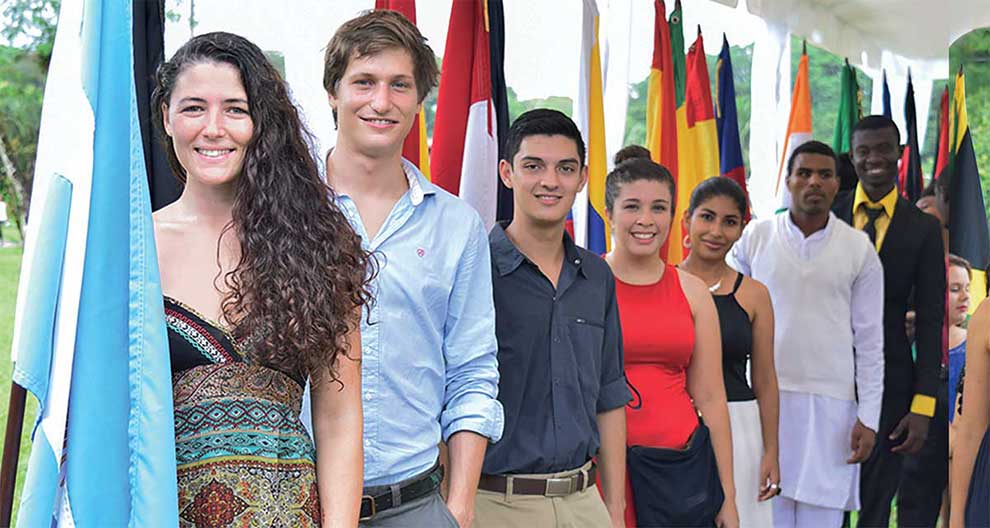
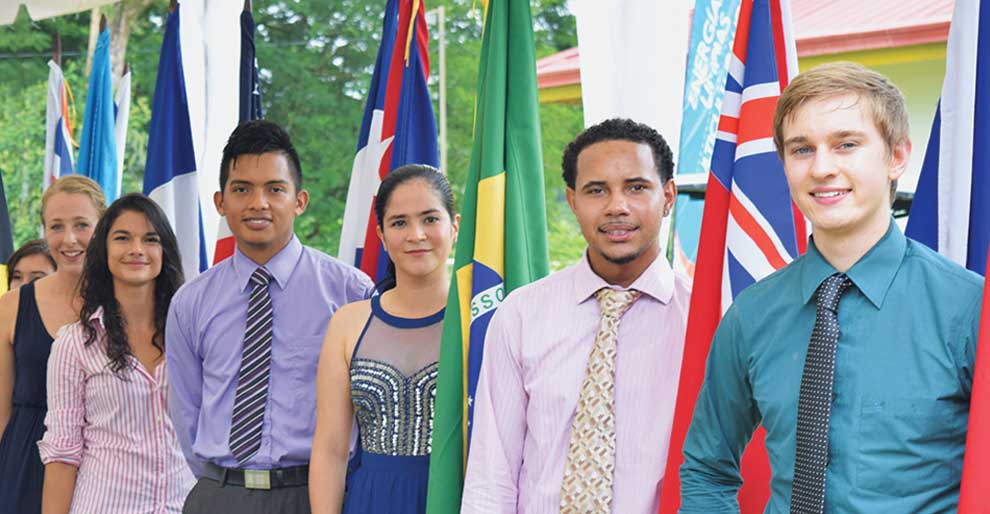
STUDENT DISTRUBUTION BY
COUNTRIES OF ORIGIN 2015
432
▼
STUDENTS
46%
▼
WOMEN
42
▼
COUNTRIES
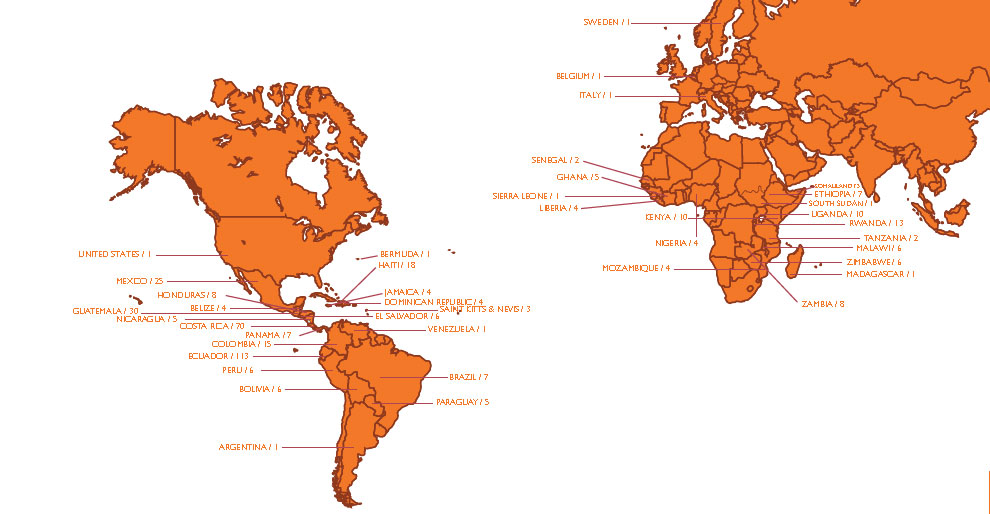
2,034 alumni from 35 countries
in Latin America, the Caribbean,
Africa and Europe.

On December 5, 2015,
EARTH graduated its 2,000th alumna:
Adriana Murillo (‘15, Colombia)
With more than 2000 alumni across the globe, EARTH graduates are generating real and positive results in their communities and nations.
Seventy-five percent of graduates surveyed in 2015 report having a direct and positive impact on the agricultural sector, primarily in increasing agricultural production efficiency, promoting the rational use of agrochemicals and integrated pest management, developing soil nutrition and quality, and conducting projects aimed at mitigating climate change.
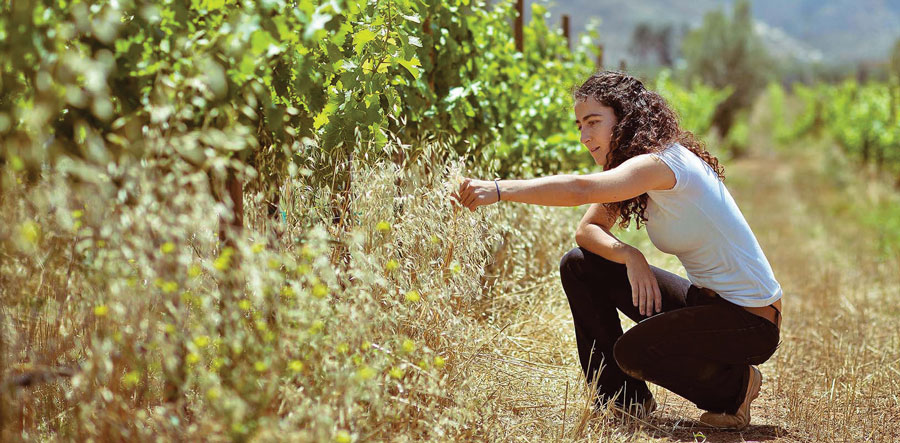
“The values and knowledge I learned at EARTH motivated me to keep learning more and to always work to achieve the delicate balance between productivity, environmental sustainability and social justice…
Studying at EARTH transformed me into a person who profoundly wants to do things well and also has the tools to do so.”
Jimene Rábago Aguilar (’09, Mexico)
June 1992-Present
More than 200,000 people have directly
benefited from CDP´s initiatives
The Community Development Program (CDP) successfully implemented actions in several nearby communities, reaching over 2,800 people last year. Our partnership with the Costa Rica Grameen Association (ACRG) has helped us collaborate with hundreds of rural women in entrepreneurial projects thanks to financing from microloans.
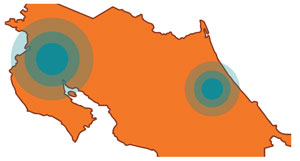
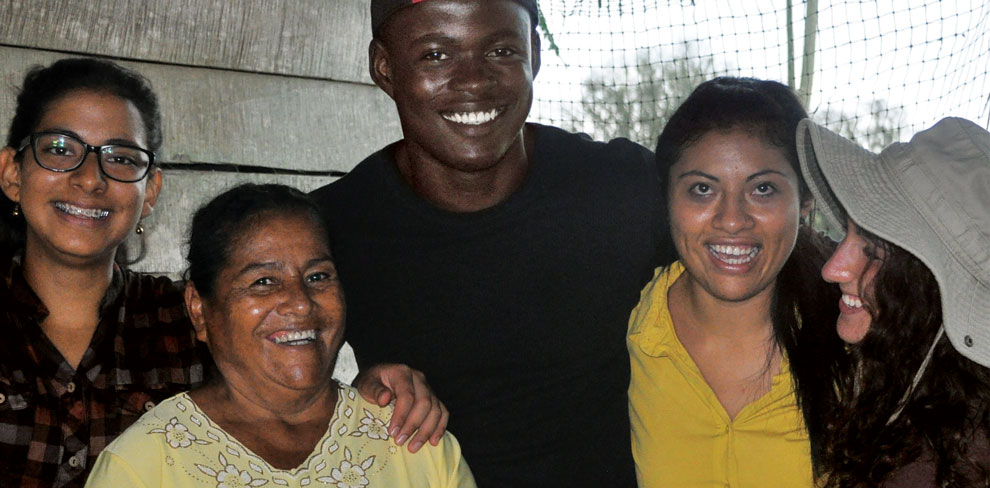
The German Ministry of the Environment, Nature Protection and Nuclear Safety listed the Center for Research and Development in Renewable Energies (CIDER) in its 2008-2014 work report as one of its worldwide exemplary projects, stressing the importance of international cooperation for the resolution of global problems.
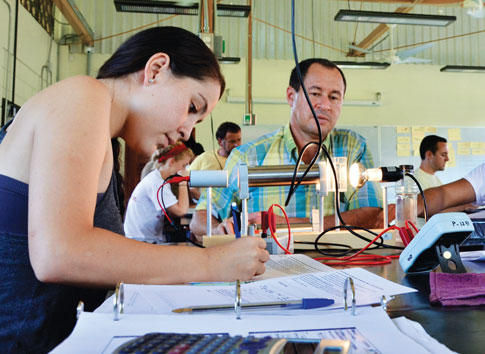 The REN@EARTH Project and CIDER were presented as one of the “21 good practices for sustainable low carbon development in developing countries” as part of the study “Exploring Sustainable Low Carbon Development Pathways”, published by the Friedrich Ebert Foundation, WWF, Actalliance, Climate Action Network, and Brot für die Welt. The examples presented in this publication are considered worldwide pioneers of change.
The REN@EARTH Project and CIDER were presented as one of the “21 good practices for sustainable low carbon development in developing countries” as part of the study “Exploring Sustainable Low Carbon Development Pathways”, published by the Friedrich Ebert Foundation, WWF, Actalliance, Climate Action Network, and Brot für die Welt. The examples presented in this publication are considered worldwide pioneers of change.EARTH is the only university in the world that requires all of its students to develop, run and close a real business venture during their undergraduate program, an approach that has proven to inspire an entrepreneurial spirit in our graduates.
Seventy-six percent of EARTH graduates surveyed in 2015 report having a direct and positive impact on the business sector, primarily in:
47%
Effective management practices, increased profitability
41%
Diversification of activities
35%
Development of new projects
29%
Development of innovative ventures
28%
Contributing tothe value chain
Twenty percent of our graduates run their own or family business. Of those, 80% have created new jobs through their enterprise.
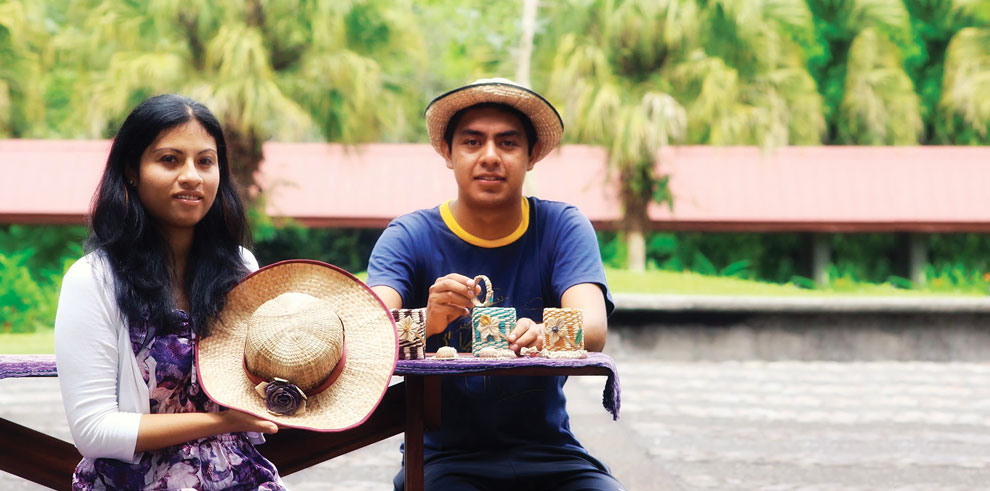
“EARTH has been the best decision of my life. Being here helped me become an entrepreneur, be more proactive and take initiative. I’ve traveled to other countries, thanks to the artisanal crafts I make.
All the goals I set for myself, I’ve accomplished. The University changed my life, and I know in the future I will make changes in my rural area.
I’ve had so much support and I know that I will fight for progress in my region.”
Sindy Ramos (’16, Guatemala)

A group of Costa Rican visionaries partnered with the United States Agency for International Development (USAID), the W.K. Kellogg Foundation and the Costa Rican Government to establish EARTH University.
Construction of the University begins.
Appointment of first University President,
José Zaglul.
On March 26, EARTH inaugurates its first class with 60 students.
EARTH graduates its first class of professionals in Agriculture Sciences and Natural Resource Management.
Oduber Elliot family donates La Flor Farm in the dry tropics of Guanacaste to EARTH University.
EARTH University is declared the first carbon-neutral campus in Costa Rica.
April 26th, 2012, EARTH partners with The MasterCard Foundation Scholars Program, greatly expanding our capacity to identify, interview and admit African students.
EARTH celebrates its 2,000th graduate and 25th Anniversary as an institution dedicated to creating leaders of change.

25 YEARS PREPARING LEADERS OF CHANGE
Pioneer graduate Edilberto Romero (‘93, Belize) was one of the first students who dared to believe in the dream of EARTH over 20 years ago. He is now the Executive Director of Programme for Belize, an NGO focused on promoting biodiversity and conservation in an area of approximately 260,000 acres. He manages several projects that are dedicated to biodiversity conservation, sustainable community-led development and agroforestry practices to help farmers improve their yields, increase revenues and reduce deforestation. His work is vital to ensuring the continued protection of forests and sustainable use of natural resources in the area.
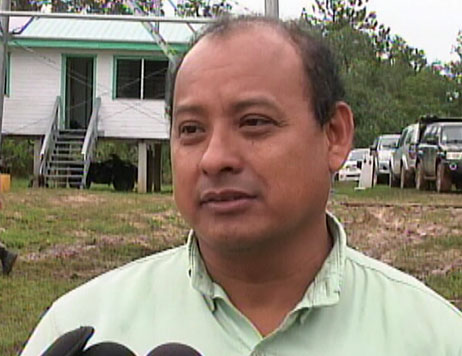
Edilberto Romero (‘93, Belize)
“EARTH opened up a path for us where we learned theory in addition to practical skills. I learned to value the knowledge of the communities, and I can say that working in the community opens up your heart and helps you to see life differently. Also, the classes that were focused on protecting the environment showed me another aspect of agriculture, which led me to complete a master’s degree in Natural Resources Economy. Today, my job is centered on production, conservation and sustainable development—and it all started at EARTH.”
Julio César Santin (’98, Brazil) has dedicated his career to promoting sustainable practices among small-scale, rural farmers, focusing primarily on forestry management to generate income
streams and restore forests. Today, he leads four silviculture technology development teams for a project with the government-owned Brazilian Agricultural Research Corporation (EMBRAPA), and is responsible for coordinating technical assistance for all of the silviculture plantations in the region.
In addition, he works as a technical consultant for the Amazon Without Fire Project, a multinational initiative financed by the Brazilian Government, Italian Cooperation Agency, and the Development Bank of Latin America. Julio is also a university professor and teaches a course on technology in agribusiness.
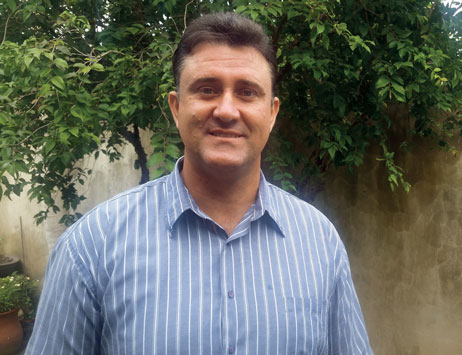
Julio César Santin (’98, Brazil)
“The professional and personal preparation that EARTH gave me has opened practically every door that I have been able to enter during my adult life. I believe that if everyone does their part we can achieve more sustainable production systems, which produce food to sustain us while preserving the environment for future generations. Every day in my work I try to plant a small seed, as I am sure that many of them will germinate and later produce good fruit.”
After graduating, Mayra Ruiz (’00, Colombia) returned to San Juan de Rio Seco, where she and her family run a coffee company called El Tabor. Mayra has also worked for the Colombian Ministry of Commerce, Industry and Tourism since 2010, leading a high-quality coffee exportation project sourced from small producers in 12 municipalities and two Nasa Wex indigenous reserves. The farmers sell to upscale coffee markets in the US and Japan, and Mayra helps them to better compete in a globalized economy that hinges on client satisfaction. Her work has had a ripple effect among the community: producers have more crop security and increased income for their families, young people see a future in farming and are less likely to migrate to the city, and locals are trained as expert coffee tasters and baristas.
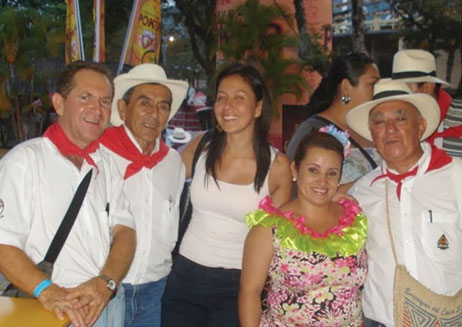
Mayra Ruiz (’00, Colombia)
“If I hadn’t studied at EARTH, I definitely would not have the business vision that I have today, nor the comprehensive training to act as an agent of change. I feel that I have a responsibility to make change, not necessarily that I need to do it myself, but rather inspire a transformation that can generate economic growth and transform people’s lives so that people do not feel the need to belong to gangs. I want people to work with pride, make money and help others.”
In September 2013, the New York Times reported that the Honduran government had awarded title of nearly 3,000 square miles in eastern Honduras to the indigenous Miskito people. At the forefront of this historic achievement was Norvin Goff Salinas (’06, Honduras) who currently represents more than 100,000 people as elected president of the Coalition of Indigenous Groups of La Mosquitia (MASTA). In mid-2015, Norvin and the Miskito community celebrated another victory when they were granted another 3,000 square miles of territory in the Río Plátano biosphere reserve, an endangered UNESCO World Heritage site. Under Norvin’s leadership MASTA has also worked to improve access to social benefits for more than 5,000 low-income families, and its economic development programs have directly benefited 12,000 families. In recognition of their contributions to sustainable development, MASTA was awarded the 2015 Equator Prize by the United Nation Development Program.
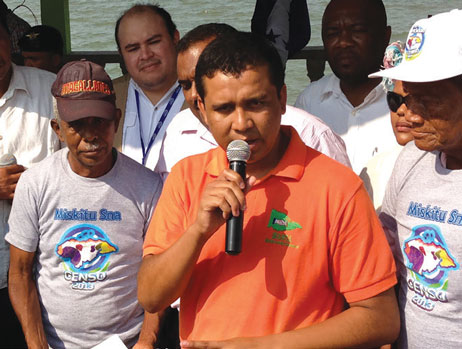
Norvin Goff Salinas (’06, Honduras)
“The diversity of teaching that EARTH students receive promotes a desire to engage yourself in today’s society. This is a great strength of the University: that it isn’t just about agronomy, but also about the community. For us, the acknowledgement of our land rights has inspired us to continue working for those most in-need, and to promote sustainable development that is just and with a community economy that ensures equity.”
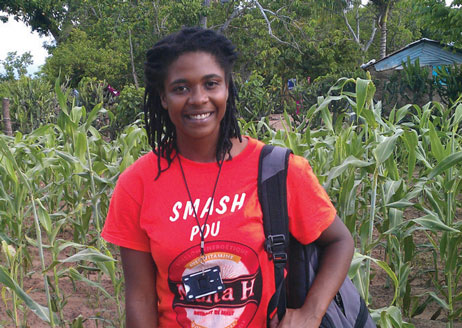
Lynhe Demesyeux (’13, Haiti)
After graduation, Lynhe Demesyeux (’13, Haiti) started a professional internship at the IF Foundation and was later offered a full time position there. She worked as Co-Coordinator of the SRI (System of Rice Intensification) project, responsible for all scientific experiments at the organization. In 2015, she began working at SMASH (Smallholders Alliance for Sorghum in Haiti/Papyrus) working with small-scale sorghum farmers to increase their production with access training in modern sustainable practices, high-quality seeds and assessment by trained agronomists. Recently, Lynhe was promoted to Regional Manager for the Northeast department and supervises four other agronomists; together they work directly with more than 1,000 farmers. Lynhe also manages a research project that evaluates the properties of sorghum varieties, with the goal of defining which ones are optimal for the region.
“I think what makes EARTH graduates different are the values and the passion we have to work together with communities, understand what they need and really make a change. Because I had experience working with communities at EARTH and during my internship, I felt really good when I started here. Although the realities of farmers in Costa Rica might be different then they are here, you can apply the same knowledge and learning.”

25 YEARS ILUMINATING LIVES
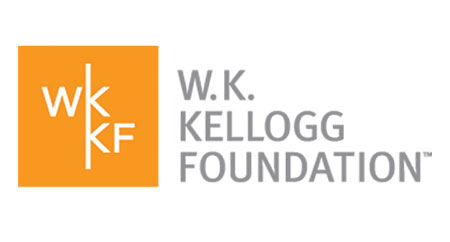 Guided by the belief that all children should have an equal opportunity to thrive, the W. K. Kellogg Foundation works with communities to create conditions that propel vulnerable children, so they can realize their full potential in school, work and life. The Kellogg Foundation understands the critical role education plays in development, and Mr. Kellogg himself noted that “education is the best way for truly improving one generation over another.” In 1984, the W.K. Kellogg Foundation generously funded the feasibility study that made EARTH University a reality. More than 30 years later, the Foundation has provided scholarship support to hundreds of young leaders at EARTH.
Guided by the belief that all children should have an equal opportunity to thrive, the W. K. Kellogg Foundation works with communities to create conditions that propel vulnerable children, so they can realize their full potential in school, work and life. The Kellogg Foundation understands the critical role education plays in development, and Mr. Kellogg himself noted that “education is the best way for truly improving one generation over another.” In 1984, the W.K. Kellogg Foundation generously funded the feasibility study that made EARTH University a reality. More than 30 years later, the Foundation has provided scholarship support to hundreds of young leaders at EARTH.
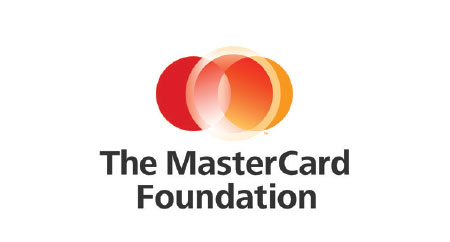 The MasterCard Foundation seeks a world where everyone has the opportunity to learn and prosper. All people, no matter their starting point in life, should have an equal chance to succeed. The Foundation focuses on helping economically disadvantaged young people in Africa and Latin America find opportunities to move themselves, their families and their communities out of poverty to a better life. The partnership between EARTH and The MasterCard Foundation’s Scholarship Program has allowed hundreds of students worldwide who may not otherwise attend college have the opportunity to study at EARTH.
The MasterCard Foundation seeks a world where everyone has the opportunity to learn and prosper. All people, no matter their starting point in life, should have an equal chance to succeed. The Foundation focuses on helping economically disadvantaged young people in Africa and Latin America find opportunities to move themselves, their families and their communities out of poverty to a better life. The partnership between EARTH and The MasterCard Foundation’s Scholarship Program has allowed hundreds of students worldwide who may not otherwise attend college have the opportunity to study at EARTH.
 Since the company’s inception in 1919, Cummins has invested talent, passion, and resources into trying to solve problems in our communities and society as a whole. Cummins firmly believes a company is only as healthy as the communities where it does business. As one of the first corporate foundations, the Cummins Foundation was created in 1954 and has served global communities. A former Cummins Executive on loan to EARTH stated, “More so than any other effort in which we are involved, EARTH’s mission cuts across all our corporate responsibility priorities at Cummins.” With the support of their Foundation, EARTH now has its first endowed professorship as well as many endowed Cummins scholarships.
Since the company’s inception in 1919, Cummins has invested talent, passion, and resources into trying to solve problems in our communities and society as a whole. Cummins firmly believes a company is only as healthy as the communities where it does business. As one of the first corporate foundations, the Cummins Foundation was created in 1954 and has served global communities. A former Cummins Executive on loan to EARTH stated, “More so than any other effort in which we are involved, EARTH’s mission cuts across all our corporate responsibility priorities at Cummins.” With the support of their Foundation, EARTH now has its first endowed professorship as well as many endowed Cummins scholarships.
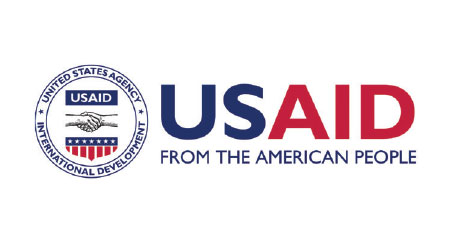 The U.S. Agency for International Development (USAID) had been working in the region for decades when the concept of EARTH was proposed. With strong support from the Costa Rican Government, USAID approved their largest commitment in their more than 30 year presence in the country to help establish EARTH University. Today, EARTH remains one of USAID’s most important legacies in Costa Rica. This partnership continues through the support provided by American Schools and Hospital’s Abroad (ASHA). Investments by USAID/ASHA have been critical for expanding and maintaining the University’s infrastructure, and have enabled the institution to dedicate more resources to providing scholarship to deserving students.
The U.S. Agency for International Development (USAID) had been working in the region for decades when the concept of EARTH was proposed. With strong support from the Costa Rican Government, USAID approved their largest commitment in their more than 30 year presence in the country to help establish EARTH University. Today, EARTH remains one of USAID’s most important legacies in Costa Rica. This partnership continues through the support provided by American Schools and Hospital’s Abroad (ASHA). Investments by USAID/ASHA have been critical for expanding and maintaining the University’s infrastructure, and have enabled the institution to dedicate more resources to providing scholarship to deserving students.
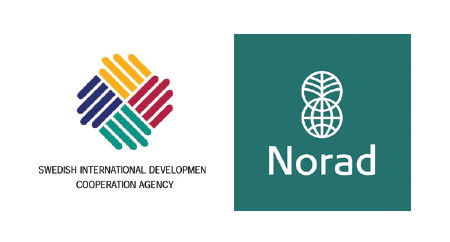 Recognizing the importance of higher education in poverty alleviation, in 1996, the Norwegian Agency for Development Cooperation (NORAD) began a long-term partnership with EARTH University to promote economic prosperity and social well-being in Central America. In this time, Norway has provided scholarships for students primarily from Nicaragua, Honduras and Guatemala.
Recognizing the importance of higher education in poverty alleviation, in 1996, the Norwegian Agency for Development Cooperation (NORAD) began a long-term partnership with EARTH University to promote economic prosperity and social well-being in Central America. In this time, Norway has provided scholarships for students primarily from Nicaragua, Honduras and Guatemala.
Two years after the start of the relationship with NORAD, the Swedish International Development Cooperation Agency (SIDA) also began a long-term partnership with EARTH providing scholarships to students, primarily from the same three Central American countries. Together, NORAD and SIDA have supported hundreds of scholars within Central America.

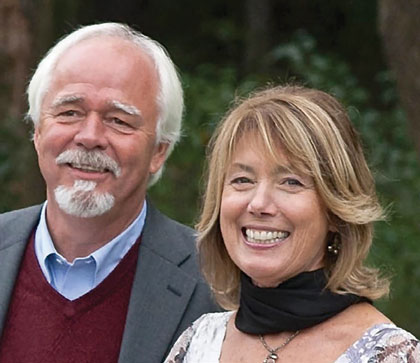
George and Clare Todd | Kalamazoo, Michigan, USA First visited EARTH in 1993
Shortly after his first visit to EARTH, George Todd began hosting EARTH interns at his family-owned business, Kalsec. Interest in EARTH grew into a family passion, and twentythree years later, George reflected on what stood out the most about the University. “One of the things we have seen is that a lot of these kids do turn into leaders. Many are back in their home countries making a real difference in the quality of life and quality of government, and they’re having an impact on the environment. I just received an email from a former intern, Daniel Ortega, and he was just named Minister of the Environment in Ecuador…My hope is that I’m around for another 23 years of wonderful interns.”
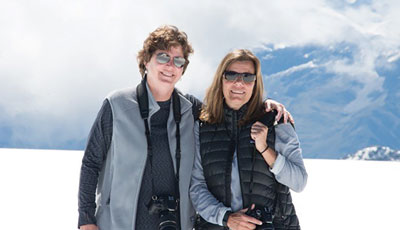
Jean Blackwell and Kim Williams
Indianapolis, Indiana, USA
First visited EARTH together in 2007
“EARTH is one of the few places that provides an intersection for our interests. Kim is very passionate about organic gardening, food safety and sustainability, and I am passionate about education and global development, particularly in emerging economies. EARTH is where we get the best of both worlds and something that feeds both of our passions.” EARTH’s next 25 years: Looking forward to the journey!
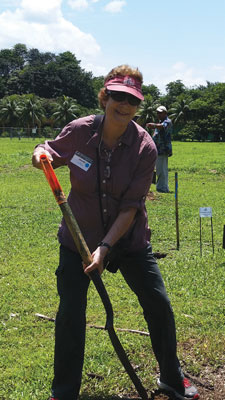
Jeannie Wright Atlanta, Georgia, USA First visited EARTH in 2003
“I have gained so much from my bird-watching travels in Latin America. Supporting EARTH felt like a fabulous way to give back to the communities by providing an education to someone who would never have had the opportunity otherwise. The High Andes of Peru is one of my favorite places for birding and also one of the poorest areas in Latin America; thus, I have chosen to sponsor students from that region”Advice to others: Go to campus and see for yourselves
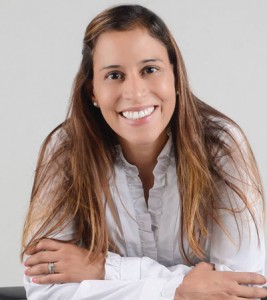
Anna Maria Oduber Daughter of the late Marjorie Elliott de Oduber and Daniel Oduber Quirós, former President of Costa Rica
EARTH-La Flor was established thanks to the great generosity of the Oduber Family in 2004. Anna Maria remembers visiting EARTH with her late mother, Marjorie, at an early age and how meaningful those visits were. “Everything that develops at EARTH is extremely inspiring; as soon as you enter and begin to speak with professors and students, you feel a contagious positive energy.” Anna Maria was recently able to take her own young daughters to visit La Flor for the first time last year. “We visited the experimental house where they maintain renewable energy alternatives. We were impressed with EARTH’s capacity to develop environmental learning programs and, with the implementation of these topics on campus, such as solar and wind energy as well as sustainable agriculture.”
As EARTH celebrated its 25th Anniversary, there were numerous examples of the positive impact of our investments. Thousands of new pathways exist in the world today through the work of our graduates. Each pathway has been illuminated by generous supporters around the world. A special thank you to those Illuminators who have made transformational gifts of one million dollars or more in EARTH’s first 25 years.
A.G. Leventis Foundation
Agencia Española de Cooperación
Internacional- CR
The ALIA Group
Banco Interamericano de Desarrollo (BID-Fondo Japón)
Jane and Dameron Black III
The Cummins Foundation
Fideicomiso Elliot Oduber
Instituto para la Formación y Aprovechamiento de Recursos Humanos (IFARHU)
Katherine John Murphy Foundation
The MasterCard Foundation
Moore Family Foundation
Norwegian Agency for Development Cooperation
Karin and Mark Ohrstrom
Open Society Foundations
Swedish International Development Cooperation Agency
SENESCYT (Globo Común Ecuador)
Denny† and Tim Solso
U.S. Department of Energy
USAID-ASHA
W. K. Kellogg Foundation
Wege Foundation
Whole Foods Market
“By supporting our strongly held ideals, we shine light upon the world, and guide not just EARTH or its students, but humanity as a whole towards a more caring, equitable and peaceful future.”
Jane Cocke Black, Founder, EARTH University Foundation
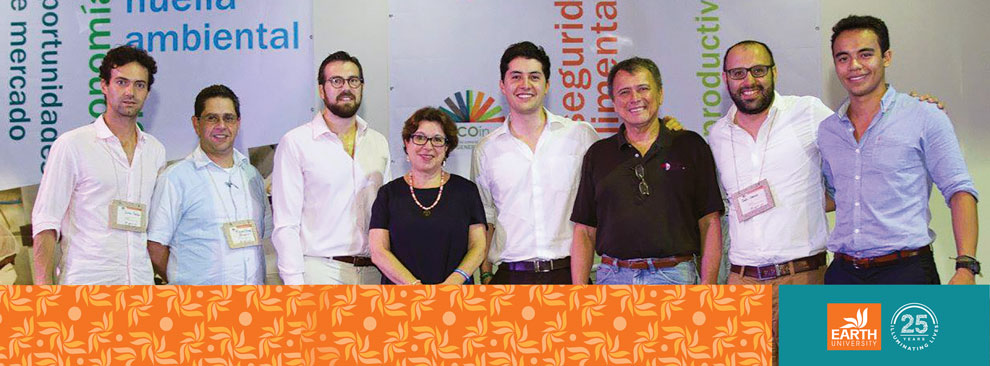
ECOin (Intergenerational Environmental Stewardship Conference) was held at EARTH University’s campus from November 5-6, 2015. The conference sought to unite generations with the common goal of creating innovative solutions to combat the effects of climate change and advance global sustainable development as a shared responsibility between the generation of young leaders and adult generation leaders represented by existing policyholders, world leaders and opinion makers. Over 600 people participated, including President Luis Guillermo Solís and First Lady Mercedes Peñas, Rebecca Grynspan, David Ives, Cristiana Figueres, Franklin Chang Diaz, finalists from the 2014 Greenovators competition, EARTH faculty, students and alumni and more. The event culminated with the signing of a document that was officially submitted to the COP 21 Climate Change Agreement in Paris.
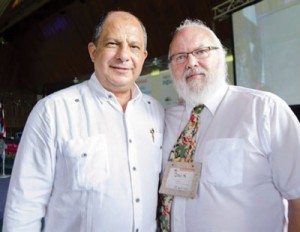
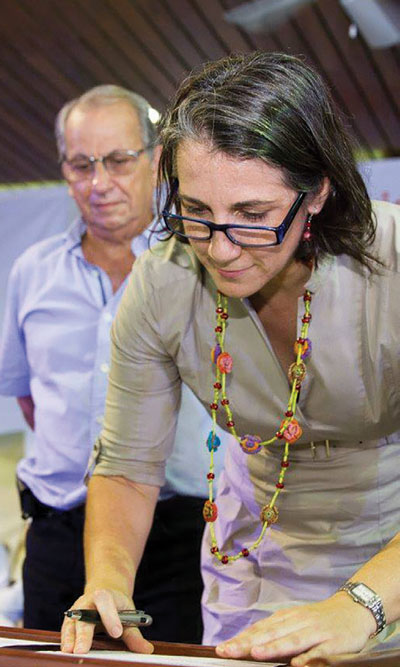
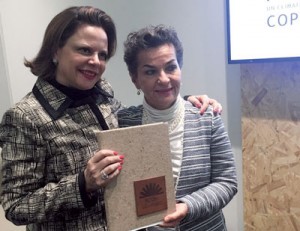
The trust and partnership we receive from our internship sponsors across the globe makes it possible for every third year EARTH student to gain invaluable work and life experience through a 15-week professional internship in the field of their choice.
Advanta Semillas SAIC, Argentina
Agrícola Las Cruzadas, Chile
Agrícola y Agropecuaria Kong, Ecuador
Agropecuaria Punta Riel S.A., Paraguay
Alexandre Family EcoDairy Farms, CA, USA
Alia2 S.A., Ecuador
Alimentos Sanos
de Yucatán, Mexico
Aquaponic Research Center, Bahamas
Arysta Life Science
(Agrifocus), Mozambique
Asociación de Apicultores
de San Pedro de Vilcabamba, Ecuador
Aurora Organic Dairy, CO, USA
Avian Technology International LLC,
GA, USA
Bioversity International, Ethiopia
Bland Farms, GA, USA
Camp Twin Lakes, GA, USA
Camposol S.A., Peru
Cape Eleuthera Institute, Bahamas
Carolina for Kibera, Kenya
Central Agricultural
Research Institute (CARI), Liberia
Centro de Estudio Postcosecha (CEPOC),
Universidad de Chile, Chile
Centro Internacional de
Agricultura Tropical (CIAT), Colombia
CORBANA S.A., Costa Rica
Corporación Favorita C.A., Ecuador
Costa Nursery Farms, Inc.,
Dominican Republic
Counisa (Allegro Coffee), Guatemala
Cummins Ghana Limited, Ghana
Cummins South Africa, South Africa
Earth Island – Follow your Heart, CA, USA
ECO – TOP Consult, Bolivia
Extractora Quevepalma S.A.,Ecuador
Finca Montefrío, Spain
FOKAL, Haiti
Frieda’s, Inc., CA, USA
Fundación Co. Honducafe, Honduras
Galápagos Flores, Ecuador
Grupo Citrofrut, Mexico
Hacienda Cacaotera
Jesús María, Mexico
Hacienda La Esmeralda S.A., Panama
Hotel Jardines del Lago, Guatemala
IDV Árbol, Peru
Instituto Interamericano de
Cooperación para la Agricultura
(IICA), Ecuador
Inter-American Institute for
Cooperation on Agriculture
(IICA), Bahamas
International Institute of
Tropical Agriculture (IITA), Uganda
International Livestock
Research Institute (ILRI), Uganda
Iowa State University, IA, USA
JPG Resources, MI, USA
K & K Pflanzen, Germany
Kalsec Inc., MI, USA
Kenya Red Cross Society, Kenya
Kibbutz Kalia, Israel
La Quinta de Sarapiquí Lodge, Costa Rica
Leventis Foundation Nigeria, Nigeria
MERCON S.A., Nicaragua
Minimex Ltd., Rwanda
Natural Pact, Costa Rica
North Dakota State
University, ND, USA
Oleoflores S.A., Colombia
Orchard Africa, South Africa
PrimusLabs, Costa Rica
Rwanda Girls
Initiative Farm, Rwanda
SEKEM, Egypt
Semen Pork Genética, Ecuador
Sisapamba Rosas & Rosas, Ecuador
SMASH/Papyrus, Haiti
Sociedad Agrícola e
Industrial San Carlos S.A., Ecuador
Sociedad Manríquez e
Hijos y Compañía Ltd., Chile
Soldive, Senegal
Sustainable Harvest
International, Belize
Sustainable Harvest
International, Panama
Tabafresh S.A. de C.V., Mexico
Taller Nuevos Territorios, Colombia
Tenuta Vannulo Organic Farm, Italy
Thuso Social
Service Foundation, South Africa
Unión Regional de Pequeños
Productores de Café Huatusco, Mexico
Universidad Politécnica Salesiana-
Centro de Investigación de la Leche (CILEC), Ecuador
University of Florida, Everglades
Research and Education Center, FL, USA
University of Florida, FL, USA
University of Florida,
Sugar Cane Growers Cooperative, FL, USA
University of Florida,
Tropical Research and Education Center, FL, USA
University of Georgia, GA, USA
University of Missouri, MO, USA
University of São Paulo, Brazil
USAID – Food and Enterprise
Development Program for Liberia, Liberia
Volcafe, Costa Rica
Zanmi Lasante / Zanmi Agrikol, Haiti
EARTH’s talented and diverse faculty members are responsible for creating a participatory and experiential learning environment that provides students with the resources and experiences necessary for their academic, personal and professional growth.
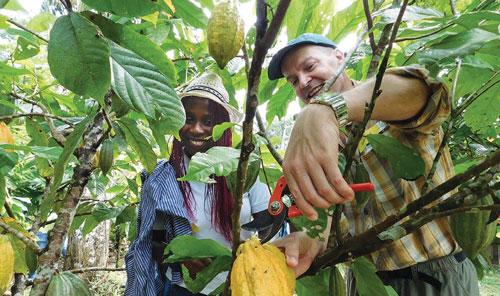
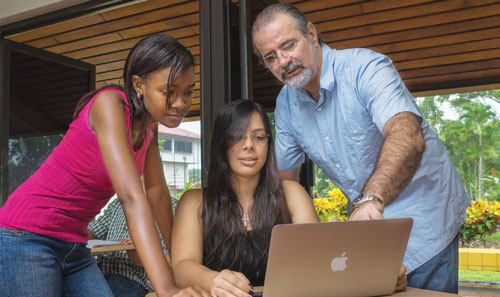
 Junior Acosta, MSc., Costa Rica
Junior Acosta, MSc., Costa Rica
Edgar Alvarado, MSc., Guatemala
Irene Alvarado, Ph.D., Costa Rica
Jorge Arce, MSc., Costa Rica
Alejandra Arroyo, Ph.D., Argentina
Steven Brenes, MSc., Costa Rica
Udi Mandel Butler, Ph.D., England/Brazil
Sergio Callau, Ph.D., Spain
Elmer Cantarero, MBA, Honduras
Róger Castellón, MSc., Costa Rica
Manuel Cerrato, Ph.D., Honduras
Yanine Chan, Ph.D., Costa Rica
Carlos Demerutis, MSc., Mexico
Nico Evers, MSc., Netherlands
Rebeca García, M.Sc., Spain
Alex Gilman, Ph.D., England
Tobías Gómez, MSc., Costa Rica
Bert Kohlmann, Ph.D., Mexico
Jeremy Lackman, Ph.D., USA
Humberto Leblanc, Ph.D., Panama
Rafael Marzall do Amaral, MSc., Brazil
Julieta Mazzola, MSc., Argentina
Kent McLeod, Ph.D., USA
Nichole McVeigh, M.A., USA
José Cristino Melgar, Ph.D., Honduras
Argenis Mora, Ph.D., Venezuela
Marvin Mora, MSc., Costa Rica
Víctor Hugo Morales, MSc., Venezuela
Gopu Nair, Ph.D., India
Walter Ndonkeu Tita, Ph.D., Canada/Cameroon
Alex Pacheco, Ph.D., Colombia
Irmino Perera, M.A., Cuba
Johan Perret, Ph.D., France
Mario Piedra, Ph.D., Costa Rica
Luis Ernesto Pocasangre, Ph.D., Honduras
Amy Porter, MSc., USA
Jorge Celso Rodríguez, MSc., Peru
B.K. Singh, Ph.D., Nepal
Ana Cristina Tamayo, Ph.D., Colombia
Roque Vaquero, MSc., Honduras
The EARTH-La Flor campus, located near the city of Liberia, Guanacaste, has created and fostered an active presence of the University in the region, instilling a mark of EARTH’s educational approach in more than 24 communities. Both private and public organizations have benefitted from the activities and many small and medium sized entrepreneurs, community organizations, schools, and groups have also reaped the benefits of the student and faculty involvement.
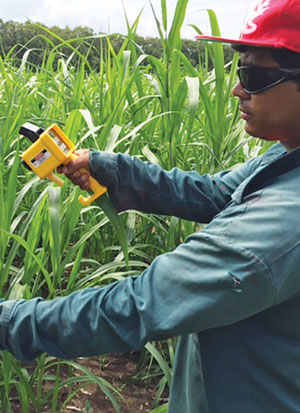 Concerned for the drought-stricken region as a result of the effects of El Niño and climate change, EARTH has actively sought and generated opportunities to work with local cattle producers with their challenges, starting with animal nutrition, food availability as well as improving the quality of traditionally available foodstuffs.
Concerned for the drought-stricken region as a result of the effects of El Niño and climate change, EARTH has actively sought and generated opportunities to work with local cattle producers with their challenges, starting with animal nutrition, food availability as well as improving the quality of traditionally available foodstuffs.
Plans are in motion to build the Center for Excellence in Precision Agriculture – a joint initiative with EARTH-La Flor and NASA-JPL in Los Angeles, California. With the creation of the Center, EARTH and NASA hope to create more jobs in the sector, promote efficient use of resources in agriculture throughout Guanacaste, and help the region adapt their production practices to the increasingly dry climate, which has already had a negative effect on farmers and ranchers.
Starting in the second half of 2015, EARTH-La Flor began researching climate change adaptation, focusing our efforts on mango, forage, hay and silage production. Our strategy is to develop new ways to manage mango plantation renovations, insect pests, nutrition, and water management.
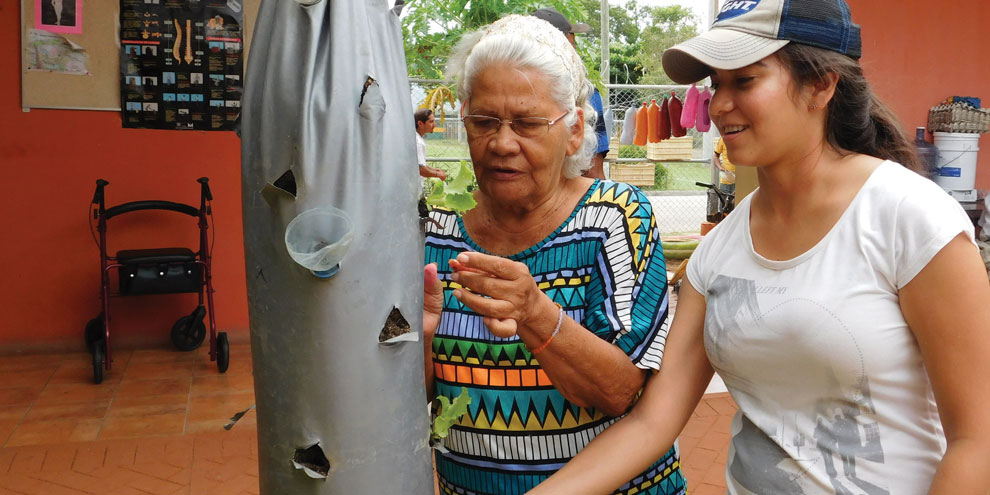
CONTRIBUTING TO THE COMMUNITY
Third and fourth year students are spending important time of their academic years at La Flor, learning, experiencing and assisting the campus with inventories, assessments, and project designs that are targeting
its sustainability. Some include: water, crops and new approaches in animal production. They also are exposed to many of the industries and agribusiness ventures in the region, and their challenges and strategies, all of which help them to be better prepared for their professional life.

| ASSETS | |
|---|---|
| Cash and cash equivalents | $ 2,408,827 |
| Prepaid expenses, deposits and other receivables | $ 39,512 |
| Receivable from EARTH | $ 153,712 |
| Pledge receivable, net | $ 6,414,493 |
| Endowment pledges receivable, net | $ 2,807,812 |
| Endowment and other investments | $ 22,141,662 |
| Cash surrender value of life insurance | $ 332,051 |
| Property and equipment, net | $ 53,836 |
| $ 34,351,905 |
| LIABILITIES AND NET ASSETS | |
|---|---|
| Liabilities | |
| Accounts payable and accrued expenses | $ 74,022 |
| Advance from EARTH | $ 100,000 |
| Scholarships payable to EARTH | $ 100,541 |
| Payable to EARTH Trust | $ 35,719 |
| $ 310,282 |
| Net assets | |
|---|---|
| Unrestricted | |
| Board designated for endowment | $ 175,000 |
| Available for operations | $ 2,075,653 |
| $ 2,250,653 | |
| Temporarily restricted | $ 7,538,272 |
| Permanently restricted | $ 24,252,698 |
| $ 34,041,623 | |
| $ 34,351,905 |
| ASSETS | Programs | Administrative | Fundraising | Total Expenses |
|---|---|---|---|---|
| Salaries and benefits | $ 507,835 | $ 196,440 | $ 444,257 | $ 1,148,532 |
| Consulting | $ 5,446 | $ 12,299 | $ 57,637 | $ 75,382 |
| Professional services | $ 6,545 | $ 43,143 | $ 6,607 | $ 56,295 |
| Office expenses | $ 48,807 | $ 82,501 | $ 70,969 | $ 202,277 |
| Travel and board meetings | $ 4,635 | $ 85,270 | $ 84,067 | $ 173,972 |
| Scholarships | $ 2,339,935 | – | – | $ 2,339,935 |
| Project and program expense | $ 2,443,849 | $ 15,639 | – | $ 2,459,488 |
| TOTAL | $ 5,357,052 | $ 435,292 | $ 663,537 | $ 6,455,881 |
| INCOME | |
|---|---|
| Tuition payments and scholarship | $9,123.8 |
| Other income (special projects, commercial activities, other donations) | $3,470.1 |
| EARTH Endowment | $6,648.8 |
| TOTAL: | $19,242.70 |
| EXPENSES | |
|---|---|
| Compensation and benefits for administrative and operational | $6,353.7 |
| Compensation and benefits for faculty and senior administrative staff | $4,626.7 |
| Operational Expenses | $5,744.6 |
| Equipment investment and replacement | $500.0 |
| Contingencies | $43.4 |
| Fundraising | $1,974.3 |
| TOTAL: | $19,242.70 |
*University Operations Budget for 2015 was $ 17.3 million plus an investment of additional $1.7 million in fundraising, for a total 2015 expense budget of $19.2 million.
HOW WE ALLOCATE OUR OPERATIONAL RESOURCES
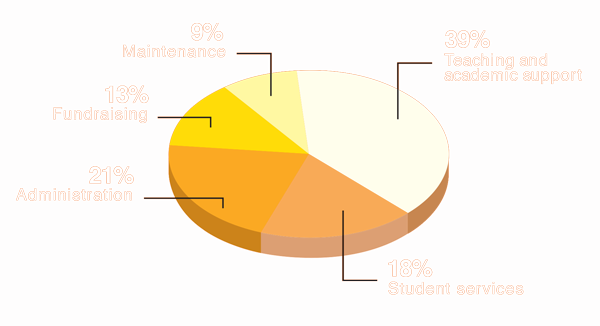
HOW OUR BUDGET IS FINANCED
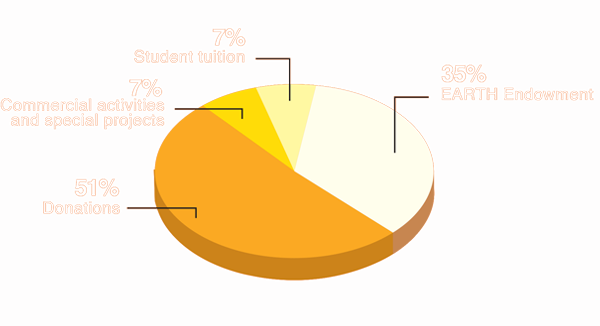
We recognize and appreciate the generous support of the following donors whose gifts were received from January 1- December 31, 2015. These individuals, businesses, foundations, governments and international organizations make the continued fulfillment of our mission possible.
Italics= Multi-year Commitment | *= EARTH Supporter for 5+ Consecutive Years | **= EARTH Supporter for 10+ Consecutive Years | ***= EARTH Supporter for 15+ Consecutive Years | ****= EARTH Supporter for 20+ Consecutive Years

For the first time in history, female students make up of an entire class – an important goal of reaching
56%
FULL GENDER PARITY IN THE UNIVERSITY.</article >
 are from rural communities,
are from rural communities,By graduation day, every EARTH student will have completed
more than 2,300 hours of:

In 2015, EARTH received a record number of applications from nearly 2,000
aspiring students in 49 nations, a reflection of our growing
international presence.

 Each year, more than
Each year, more than 92%
92%
of all students are awarded
need based financial aid,
with most receiving full scholarships.

Tim Solso, President, IN, US
Alan Kelso, Vice President, Costa Rica
Pedro León, Secretary, Costa Rica
Ana Regina Aguirre de Riojas, Guatemala
Abdallah Alaoui, Morocco
Anne Slaughter Andrew, MD, USA
Marisa Brenninkmeyer, UK
Franklin Chang-Díaz, Costa Rica
Francis Durman, Costa Rica
Carlos Enrique González Pinto, Costa Rica
Olav Kjorven, Norway
Randal Teague, VA, USA
Isabel Abreu, Dominican Republic
Salvador Alemañy, Puerto Rico
†Rodolfo Cortes R., Costa Rica
†Jorge Manuel Dengo O., Costa Rica
†Hernán Fonseca, Costa Rica
†Eduardo King Carr, Brazil
Luis Alberto Monge Álvarez, Costa Rica
†José Elias Sanchez, Honduras
†Glen Taggart, USA
Randal Teague, President, VA, USA
Randi Yoder, Vice President, MN, USA
G. Richard Fletcher, Treasurer, CA, USA
Mark Ohrstrom, VA, USA
Tim Solso, IN, USA
†Norman A. Brown, USA
Mark Ohrstrom, President, VA, USA
Therus Kolff, Treasurer, UT, USA
Kent Alexander, GA, USA
Ross Arnold, GA, USA
Joshua Arnow, NY, USA
Michael Besancon, CA, USA
Jane Black, GA, USA
Mark S. Brouse, UT, USA
Kathleen Colson, VT, USA
Ian Davidson, UK
Sylvia de Leon, DC, USA
Lynn Hoffman-Brouse, UT, USA
Ronald Hoge, CA, USA
Alan Kelso, Costa Rica
Gustavo Manrique, ‘96, Ecuador
Mark McGahan, GA, USA
Adrienne Meisel, IL, USA
Tim Solso, IN, USA
Randi Yoder, MN, USA
John Bridgeland, President, VA, USA
Ashleigh Black, SC, USA
Jane Black, GA, USA
Carlos Gustavo Cano, Colombia
Ernesto Castegnaro, Costa Rica
Rick Foster, MI, USA
Elke Hawila, UK
Abdulsalam Haykal, Syria
Whitney MacMillan, MN, USA
Malcolm W. Wilson, CO, USA
Ann Kerr-Adams, CA, USA
Edward Brenninkmeyer, President, Brazil
Coco Brenninkmeyer, UK
Caily Bridgeland, VA, USA
Fallon Bridgeland, VA, USA
José Mauricio Cano, Colombia
Olli Coupe, Australia
William Dunn, CA, USA
Sofia Englund, CA, USA
Paula Arantes Ferraz, Brazil
Gabriela Frías, GA, USA
Audrey Gatins, GA, USA
Viviana Gazel, Costa Rica
Amanda Hawila, UK
Elena Hawila, UK
Dia Haykal, Lebanon
Davar Irvani, GA, USA
Alishba Kassim, NY, USA
Adam Klopp, DC, USA
Christopher Kobes, VA, USA
Chelsea Kolff, NY, USA
José López-Sánchez, DC, USA
Cameron McLain, CA, USA
Sophie Morrison, NY, USA
Lily Rubino, NY, USA
Shukri Shammas, UK
Joshua Stroman, MA, USA
Jonathon Taee, NY, USA
Alex Ward, UK
Johnny Winn, UK
Lucien Zeigler, VA, USA
Jose Zaglul, President
Daniel Sherrard, Provost
Gerardo Mirabelli, Vice President of Development
Edgar Alvarado, Dean
Patricia Loria, Finance

I am looking forward to bringing back my own knowledge to Mozambique, where my people are facing an economic crisis. When I graduate and start my own business that creates job opportunities in sustainable agriculture, I will have created another ripple of positive change in the world. It is all thanks to the generosity of donors that I am realizing my dreams at EARTH University. Their encouragment and investment in me have changed my life, and I too have learned how to change the lives of others.
Eva Mulandesa (‘17, Mozambique)